Hitz Technical Review Vol.84

- 1.Further Stability of Waste to Energy Plants ―Addition of AI Models for Garbage Layer Differential Pressure Stabilization and Combustion Image Prediction
- 2.Stable Operation of Waste to Energy Plants by Controlling Steam Temperature at Outlet of Superheater Using Multiple Regression Analysis Method
- 3.Development of Nitrite Denitrification Treatment Technology for Sewage Discharge
- 4.Bolero : High-Strength Bolt-Tightening Determination System Using AI Technology
- 5.Higher Precision by Improving PAUT Flaw Detection Analysis Method for Tube to Tubesheet Welds Using Deep Learning
- 6.Development of Ultra-Narrow Gap Submerged Arc Welding Process for 21/4Cr-1Mo Steel
- 7.Investigation Results of Marine Growth on Dynamic Cable of Floating Offshore Wind Turbine and Demonstration of Maintenance Methods
[Short report]
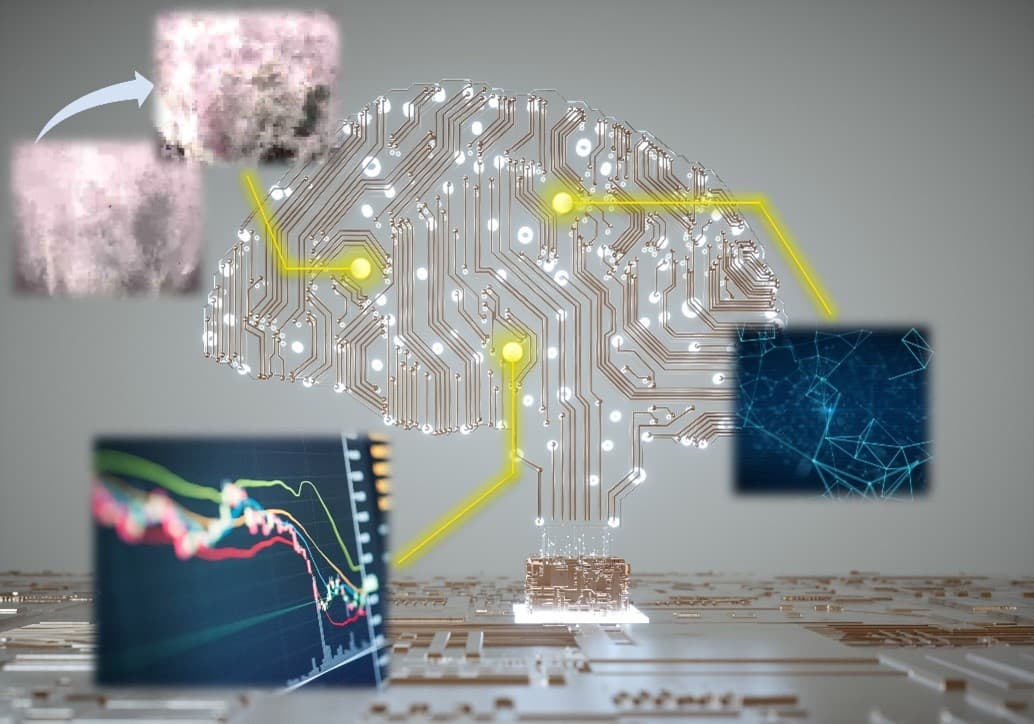
In our work with Waste to Energy plants to date, Hitachizosen has developed an AI model called Combustion State Prediction System, designed to predict the possibility of combustion deterioration in the next few minutes based on the behavior of multiple sensors, and to perform additional control to avoid that deterioration. In this project, we added two more AI models to improve the prediction accuracy. The first, called the Waste Layer Differential Pressure Stabilization model, corrects waste feeding control when the amount of waste on grates becomes abnormal. The second, called the Dynamic State Prediction model, predicts combustion images five minutes after based on combustion videos of the last several tens of minutes.
The results of a long-term verification test conducted with an AI model integrating the three models found that it can maintain a better combustion state than the conventional AI model. In addition, compared to a control group using only Automatic Combustion Control(ACC), the time for combustion deterioration was reduced by 58%, and the number of manual interventions was reduced by as much as 86%.
- Lead author
- Akifumi Ise
- Joint author
- Chikako Nishihara, Yukio Onuki, Go Watanabe, Shinji Motoyama, Sachiko Shigemasa
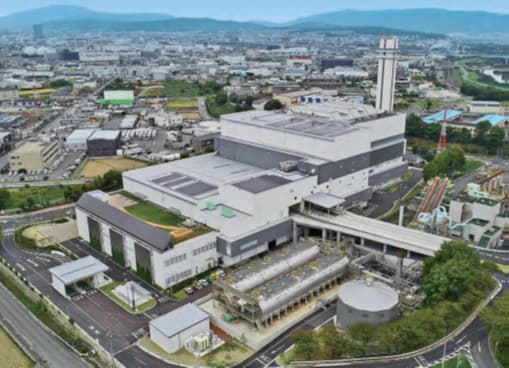
Hitachizosen, in cooperation with Southern Kyoto City Clean Center, has developed a superheater outlet steam temperature control method utilizing multiple regression analysis to improve the stable operation of waste to energy plants.
In this project, we focused on the relationship between incineration gas and steam fluctuation caused by fluctuations in the calorific value of feed waste to establish a data-driven predictive model formula taking into account influential factors such as elapsed time, operations, and external disturbances, and applied it to steam temperature control at the outlet of the vessel. The results showed that by introducing feedforward control using the prediction value after two minutes to the multiple regression analysis method, controllability improved of the superheater outlet steam temperature in response to high temperatures and high pressures, along with the stability of the combustion state and turbine power generation amount. It also had the effect of reducing corrosion and thinning of the third superheater tube.
This will lead to the stabilization of the waste incineration power plant, and the continued stable operation of the furnace will prevent equipment damage and deterioration, and thus help prolong the plant’s service life. In addition, automated operation using AI and ICT will contribute to reducing human intervention as well as minimizing manual DCS operation.
- Lead author
- Tadayuki Arai
- Joint author
- Takuo Sato, Yuji Shiraishi, Miyuki Tosa
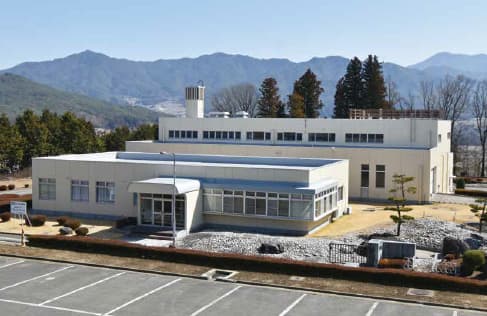
In our work to develop technologies for reducing the environmental load and cost of treating human
waste, Hitachizosen had developed a nitrite oxidation / denitrification treatment technology for pre-dewatering sewer discharge systems. This paper reports the results of demonstration tests that revealed its effectiveness.
The demonstration tests found that the nitrite oxidation rate can be maintained at approximately 80% or higher by controlling the ammonia concentration in the nitrification tank. In addition, we adjusted the amount of actual liquid input from the human waste treatment facility into the test equipment(2.0–4.5m3/day) to change the nitrogen input load in three stages and evaluated the operating status at each load. During high load, when operated at a nitrogen input load of 0.21kg-N/kg-SS/day-1(average), stable operation continued with treated water quality of T-N 150mg/L or lower, which is below the standard water quality of sewage discharge, as during standard load and low load.
The data obtained during eight months of demonstration tests was verified by the Japan Environmental Sanitation Center. Hitachizosen then received a performance investigation report in October 2022.
- Lead author
- Yusuke Tanabe
- Joint author
- Akitoshi Tateno
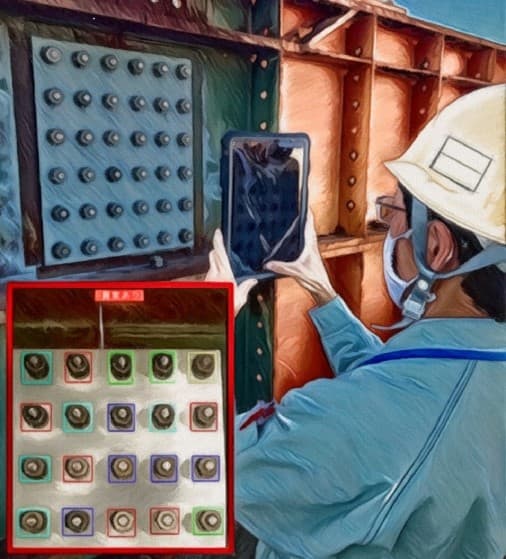
In steel bridge construction, the members are joined using numerous high-strength bolts. The technique generally employed for the management of friction fastening is visual determination from a state in which the bolts have been marked by an inspector before final tightening. With the aim of reducing missed inspections of the high-strength bolts used in large quantities, in this project, we developed a high-strength bolt-tightening state determination system that uses images captured with a mixed reality device and tablet terminal.
The system uses YOLO object detection technology to detect the high-strength bolts, and deep metric learning to determine the degree of deviation from normal conditions. The captured images are subjected to a Laplacian filter to calculate amounts of blur. Very blurred images are then excluded from the determination target, so that even if the camera shakes at the time of shooting, the system does not malfunction and inspections can continue. The results of an operation test carried out on an actually erected girder confirmed that the system can determine tightening conditions with high accuracy.
- Lead author
- Takashi Okamura
- Joint author
- Takahiro Wada, Toshihide Miyake
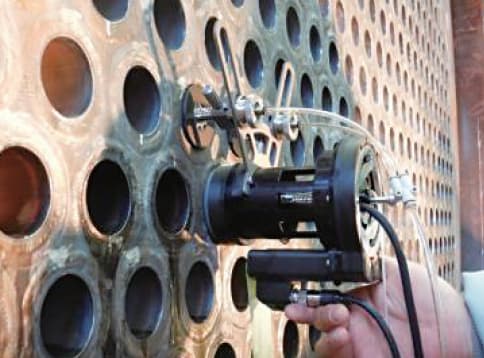
Hitachizosen Corporation and NICHIZO TECH INC. had developed a phased array ultrasonic testing system for tube to tubesheet welds of multi-tube heat exchangers and applied it to actual inspections. The system uses deep learning AI technology to accurately detect harmful defects that occur in tube to tubesheet welds. Through inspections conducted on over 50,000 tube to tubesheet welds to date, the inspection method has been recognized by users as being useful. The system determines the presence or absence of defects using image data, but this feature had issues with not being able to extract the inspection range in the image and detecting excessive reflection echoes that are not defects. Therefore, we solved these problems by improving the method of extracting the inspection range and by utilizing new AI technology. This has made it possible to perform higher-precision inspections than before and apply our inspection services to various multi-tube heat exchangers.
- Lead author
- Takeru Katayama
- Joint author
- Kaoru Shinoda, Toshiya Takenaka, Masamitsu Abe, Ryota Ioka, Takahiro Wada,Hiroshi Hattori(NICHIZO TECH INC.)
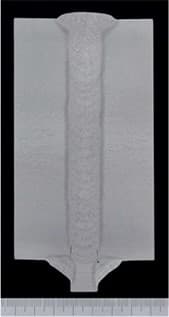
Improving the efficiency of the welding process is essential for the manufacture of large steel structures. Ultra-narrow gap submerged arc welding, performed with a nearly 0° groove angle from the first to the last layer in a single pass, is a process that can be expected to significantly improve welding efficiency. Compared to conventional narrow gap welding, however, ultra-narrow gap welding is seldom seen in practical application because of its tendency to cause weld defects such as lack of fusion and slag inclusion. Hitachizosen, therefore, decided to develop an ultra-narrow gap welding technique that does not cause such weld defects.
We first identified the range of welding conditions that prevents weld defects using digital welding power source, and then developed an in-process program for the automatic selection of welding conditions using multiple regression analysis and optimization method. Finally, we applied the technique we developed to a 120mm thick test coupon of 21/4Cr-1Mo steel, a material generally used in pressure vessels. The results demonstrated sufficient weld quality for the practical application of ultra-narrow gap submerged arc welding.
- Lead author
- Yohei Abe
- Joint author
- Takahiro Fujimoto, Mitsuyoshi Nakatani, Masakatsu Nakano, Masamitsu Abe,Yuichi Kobayashi, Manabu Tanaka(OSAKA UNIVERSITY), Masaya Shigeta(TOHOKU UNIVERSITY)
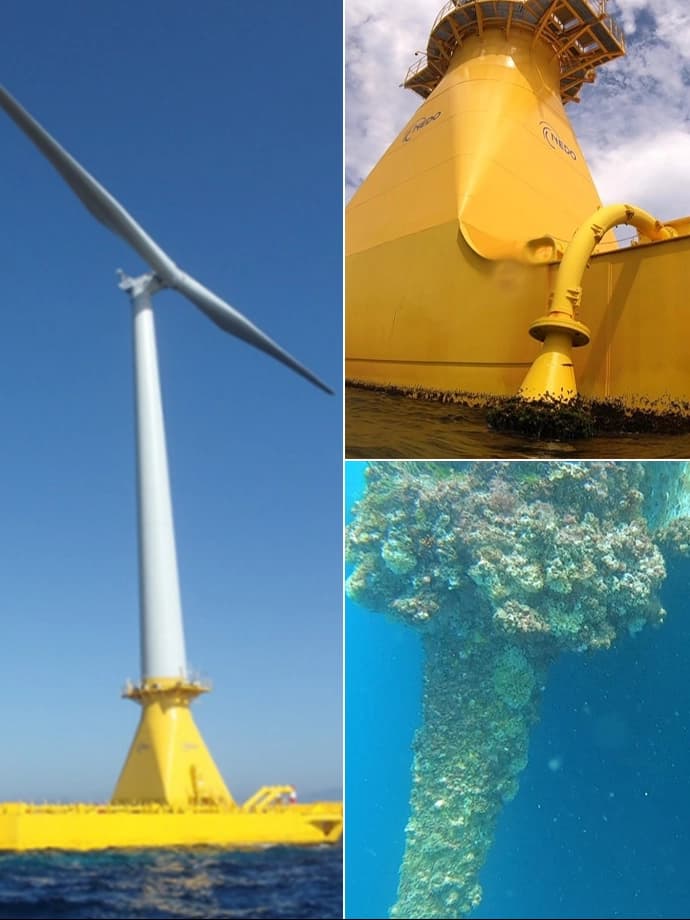
As part of a demonstration project commissioned by the New Energy and Industrial Technology Development Organization(NEDO), Hitachizosen installed a 3MW barge-type floating offshore wind turbine(FOWT)in Kitakyushu and has been carrying out a demonstration operation since 2019. During this demonstration operation, the dynamic cable subsided and landed on the seabed due to marine growth.
This paper describes the restoration work of the dynamic cable by adding buoys, the investigation results of the marine growth on the dynamic cable, and the demonstration of our maintenance technologies. In our investigation into the amount of marine growth, we organized the data on the transitions in thickness of marine growth and water depth, and in weight and water depth, and found a remarkable relationship between the amount of marine growth and water depth. We also worked to monitor the depth of the dynamic cable for maintenance purposes and demonstrated that remote monitoring is possible with relatively inexpensive equipment. Furthermore, we worked on the removal of the marine growth using a remotely operated vehicle(ROV)and verified its practicality in the future.
- Lead author
- Shigeki Okubo
- Joint author
- Shunsuke Mitani, Osamu Azumaya, Hideyuki Niizato
[Short report]
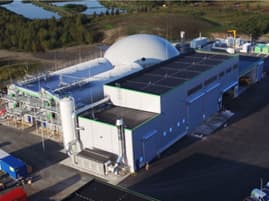
Hitachizosen Inova AG (HZI) has developed Digester Performance Monitoring (DPM). It is currently being piloted at a dry anaerobic digestion plant (Kompogas® plant) to evaluate the solution’s performance during live plant operation, towards the aim of commercialization in 2024.
The Kompogas® plant in Jönköping, Sweden, produces biogas from local organic waste through dry anaerobic digestion and further upgrades it into biomethane, which is then sold as fuel for CNG vehicles.
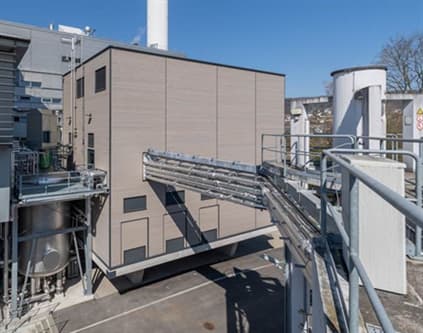
The energy-rich gases hydrogen and methane, which can be produced via the power-to-gas (PtG) process, are crucial for the energy transition. As renewable synthetic gases, they absorb energy from wind and PV power and make it storable in the gas grid. Methane is particularly well suited for trouble-free application in climate protection projects due to the widespread availability of the gas grid and the established technology.
HZI Schmack GmbH has completed an industrial PtG plant at a waste to energy and wastewater treatment complex owned by Swiss utility Regiowerk Limeco (Dietikon, Canton of Zurich). The PtG plant produces high purity methane gas from hydrogen and CO2 in a biological reaction and the produced methane gas is fed into gas grid.
Click here for inquiries about Kanadevia technology
